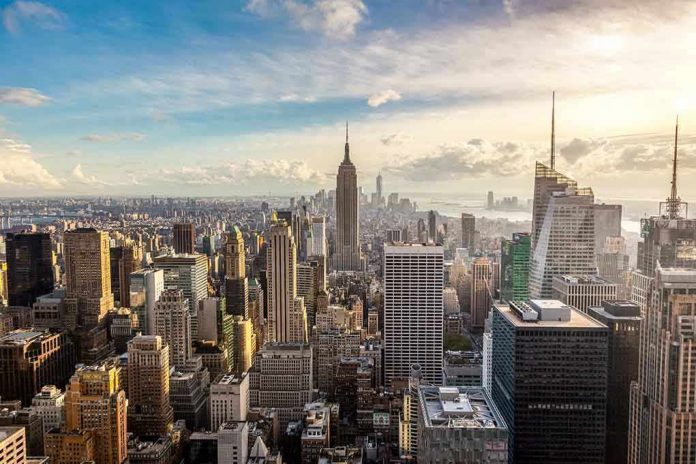
Zohran Mamdani’s radical rent freeze plan threatens to devastate mom-and-pop landlords, turning the American dream of property ownership into a “kiss of death” for thousands of New Yorkers.
Story Snapshot
- NYC mayoral candidate Zohran Mamdani proposes a four-year rent freeze for nearly 1 million rent-stabilized apartments, alarming small landlords.
- Landlords warn the policy could make properties unsellable, threaten affordable housing, and force many out of business.
- The Rent Guidelines Board (RGB), not the mayor, holds legal authority over rent adjustments, raising doubts about the plan’s feasibility.
- Expert analysis reveals likely consequences: deteriorating housing stock, financial crisis for small owners, and greater polarization in the city’s housing debate.
Rent Freeze Proposal Sparks Fierce Backlash from Small Landlords
Zohran Mamdani, Democratic nominee for New York City mayor, has made a four-year rent freeze for the city’s nearly 1 million rent-stabilized apartments the centerpiece of his campaign. Tenant activists have mobilized aggressively behind the proposal, but small landlords—often multigenerational family businesses and immigrants—are sounding the alarm. They argue this freeze would cripple their ability to keep up with rising costs, maintain buildings, and ultimately threaten their financial survival. Many see this as a direct attack on property rights and a dangerous erosion of American values.
https://www.youtube.com/shorts/ilgCCOBltZ0
Landlords fear that if the freeze passes, their buildings will become unsellable, as potential buyers would be wary of inheriting regulated properties with frozen income and rising expenses. The growing sense of panic is compounded by concerns that government overreach is making it impossible for responsible owners to operate. The notion of generational wealth and the ability to pass down a family business is now in jeopardy. Many warn that the proposal would force them into insolvency, removing a crucial segment of affordable housing from the market.
Legal and Political Roadblocks: Who Really Has the Power?
Despite the sweeping promises of the Mamdani campaign, the actual authority to implement a rent freeze lies not with the mayor but with the independent Rent Guidelines Board (RGB). The RGB, whose members are appointed by the mayor, has the legal mandate to determine annual rent adjustments on stabilized apartments. Experts and legal analysts note that any attempt by the mayor to impose a multi-year citywide freeze would likely face immediate legal challenges. This reality raises serious questions about the feasibility and legality of Mamdani’s headline policy, suggesting it may be more political theater than genuine solution.
Mayor Eric Adams, running on an independent line, has publicly called the freeze “short-sighted,” warning it would lead to deteriorating building conditions and a decline in affordable housing quality. Meanwhile, former Governor Andrew Cuomo has proposed “Zohran’s Law,” which would restrict rent-stabilized units to lower-income tenants, offering a competing vision and highlighting the deep divisions in the city’s approach to housing policy.
Consequences for NYC’s Housing Market and Community Stability
Expert analysis paints a stark picture of the likely fallout. In the short term, small landlords would face immediate financial strain, unable to adjust rents to cover inflation, property taxes, and maintenance. Over time, this pressure could force many out of business, leading to property neglect or sales to large corporate investors less invested in community stability. The result could be a sharp decline in building quality and a shrinking pool of truly affordable housing. While tenants might see temporary relief, the long-term risk is a weakened housing stock and the loss of independent, community-based property owners.
The debate has triggered a new wave of polarization between renters and owners. Tenant Bloc, the activist group behind the campaign, has successfully mobilized renters frustrated by rising costs. Yet small landlords—often immigrants and minority owners—feel politically marginalized and demonized as scapegoats for broader economic failures. The city’s housing policy has become a flashpoint for larger ideological battles over property rights, government intervention, and the future of American cities.
Mom-and-pop NYC landlords fear getting stuck with unsellable properties if Mamdani wins: ‘The kiss of death’ https://t.co/XE737fnQ6t
— Kay (@Kay73744103) August 28, 2025
Academic and policy experts are divided. Some warn that rent freezes, while politically popular, can reduce investment in building quality and discourage new construction. Others emphasize the need for targeted reforms that protect both tenants’ stability and landlords’ solvency. The only clear consensus: radical, activist-driven policies that ignore economic realities threaten to undermine the very communities they claim to protect.
Sources:
What Zohran Mamdani’s Primary Win Means for the Tenant Movement (Shelterforce)
Zohran Mamdani, Freeze Rent, and the Legal Power of the Rent Guidelines Board (City Journal)
Proposed Rent Guidelines for October 1, 2025 through September 30, 2026 (NYC Official Rules)
Freeze the Rent: How Many Apartments, Exactly? (City & State NY)




